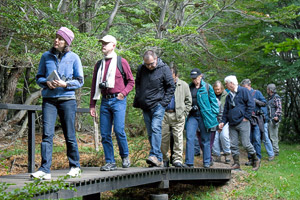Cape Horn Research Field Station Opens
The station is the first dedicated to environmental philosophy, science and policy.
March 11, 2011

Visitors to the Omora Park in Chile for the inauguration of the Cape Horn Field Station
in January included participants in UNT's Travel Learn program, as well as university
administrators. (Photo by Adam Wilson)
UNT, in partnership with the Universidad de Magallanes, the Chilean Institute of Ecology and Biodiversity, and several U.S. and Chilean nonprofit organizations, opened the world’s first field station dedicated to environmental philosophy, science and policy at the southern tip of Chile in the village of Puerto Williams in January.
The new Cape Horn Field Station — equipped with a kitchen, library, classrooms, computer area and laboratory for processing and storing research samples and other field equipment — supports an international network for interdisciplinary environmental research opportunities for faculty, students and affiliated research scholars. The station will help to place UNT’s work at the forefront of research, education and conservation of biocultural diversity.
“The goal is to have students doing research in Chile year-round so they can have a direct experience in crossing language barriers and working with students from other countries, scientists and the local society,” says Christopher Anderson, assistant research professor of biology and coordinator of the Sub-Antarctic Ecosystems and Biocultural Conservation Program and research cluster.
“Our mission is not just to do research but to develop long-term working relationships with local authorities and community members and to make the research socially relevant.”
The program’s unique integration of ecological sciences with the humanities builds upon UNT’s strong tradition as the world’s premier program in environmental philosophy.